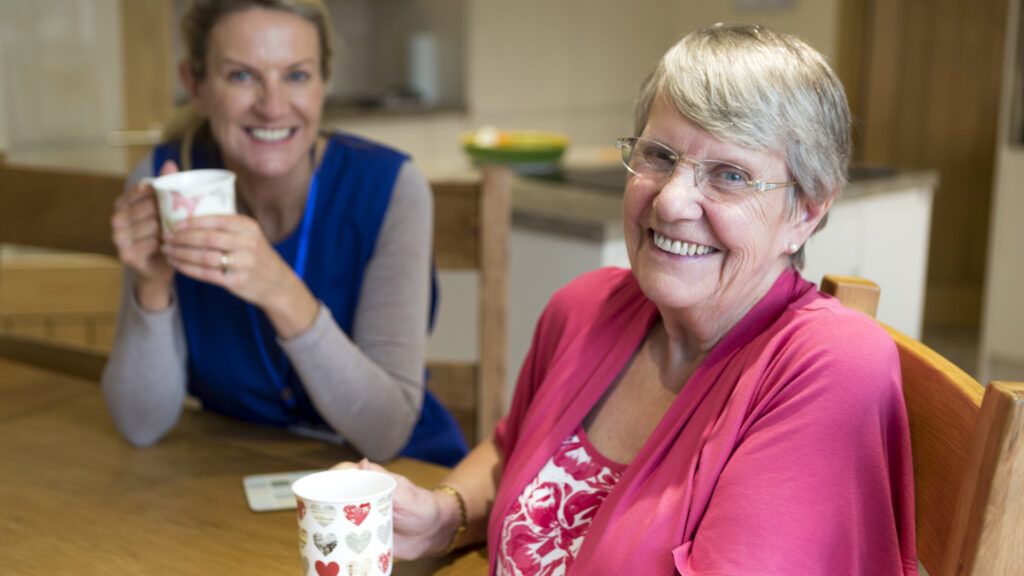Kerstin Yoder, LISWS, is a Social Worker/Group Coordinator with Behavioral Health Services at Benjamin Rose Institute on Aging.
You are on the frontlines when you’re the primary caregiver to your loved one. As the point-person for day-to-day care needs, you are central to maintaining his or her physical and emotional well-being. That means that you’re probably the first person to spot any signs of health changes, including indications that your loved one may be depressed. If so, there is much you can do to help. The first step is to understand and recognize the signs of depression.
Signs of depression
It is important to become familiar with how depression presents, especially among older adults. There is a common misunderstanding that depression is a normal part of growing older. This is not true. According to the Mayo Clinic, signs and symptoms of depression include, but are not limited to:
- Feelings of sadness, tearfulness, emptiness or hopelessness
- Angry outbursts, irritability or frustration, even over small matters
- Loss of interest or pleasure in previously enjoyable activities
- Isolation and feelings of loneliness, or withdrawal
- Insomnia or sleeping too much
- Tiredness and lack of energy, so even small tasks take extra effort
- Increases or decreases in appetite, resulting in weight gain or loss
- Anxiety, agitation or restlessness
- Slowed thinking, speaking or body movements
- Feelings of worthlessness or guilt, fixating on past failures or blaming oneself for things that are not one’s personal responsibility
- Trouble thinking, concentrating, making decisions and remembering things
- Frequent or recurrent mention of death or, in severe cases, thoughts of self-harm or suicide
- Unexplained physical problems, such as back pain or headaches
Keep in mind that everyone goes through mood changes and times of melancholy, and your loved one is no exception. But if the depression symptoms listed above last more than two weeks and impact his or her ability to handle the tasks of daily living, it’s important to take immediate steps to help.
How to respond to signs of depression
- Encourage your loved one to get professional help
Once you have spotted signs that your loved one may be depressed, it is important to encourage him or her to seek treatment from a mental health professional. A person who is depressed may not even be aware of it. Your loved one might think that these symptoms are normal, even though they indicate possible depression.
It’s not unusual for people to feel embarrassed about experiencing depression and to tell themselves they can beat it through sheer force of will. However, depression rarely improves without professional help, and may actually escalate. With proper treatment, your loved one can start to get better.
You may consider guiding your loved one to these good resources:
- The SAMHSA National Helpline at 1-800-662-HELP (4357) or National Suicide Prevention Hotline at 800-273-8255
- Local mental or behavioral health services, such as those offered by Benjamin Rose Institute on Aging
- In-person or virtual support groups
- Individual or group therapy
- Don’t ignore worsening symptoms
Depression that grows worse over time should be treated as soon as possible. Talk to your loved one about working with a mental health professional to arrive at a plan of action should signs and symptoms reach an agreed-upon point.
- Lend your support
Although you are not a mental health professional, your support can go a long way. Keep in mind that your loved one’s depression is not anyone’s fault, including yours. Although you can’t “fix” someone else’s depression, your support, understanding and compassionate listening to your loved one’s thoughts and emotions can help him or her feel understood. You can also assist with day-to-day chores and errands. Depression can make everyday tasks—like getting to the store and picking out food—feel impossible, so offering your help in practical ways can do much.
- Practice self-care
As you help your loved one heal from depression, don’t forget to take care of yourself. It’s easy to neglect your own mental, emotional and physical needs when you focus on someone else’s needs. But your self-care is vital, not only for your own well-being but for your loved one’s emotional and physical health. Meeting your own needs gives you the strength to handle all that you need to do on a daily basis The good news is that depression is treatable and you and your loved one can find the support you both need.






